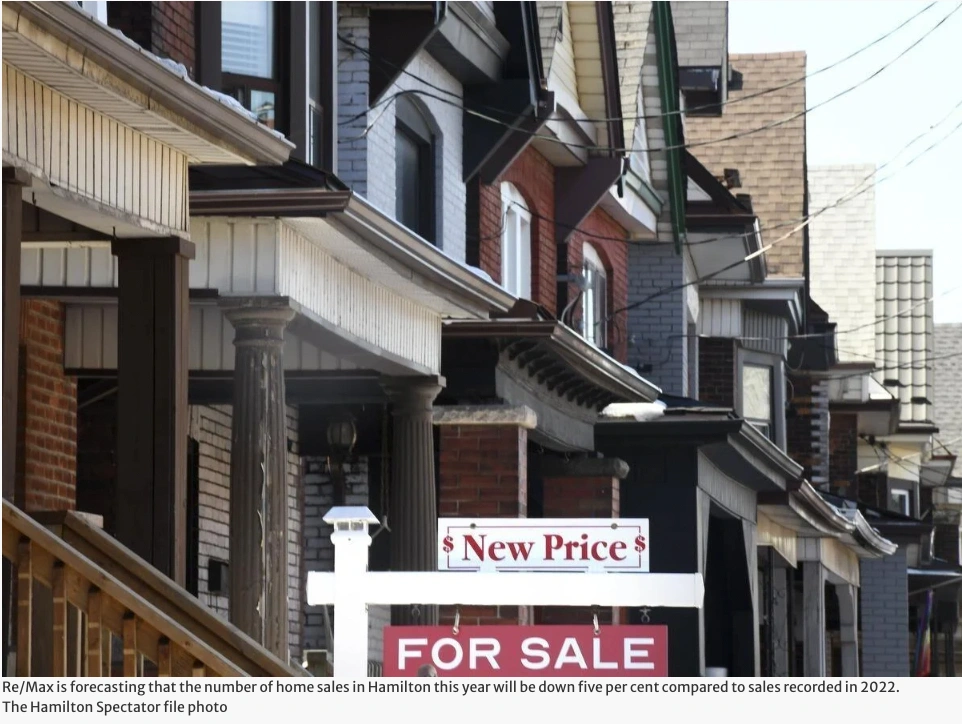A new Re/Max Canada report has forecasted that the averaged sale price of a home in Hamilton will drop another two percent by the end of the year.
Written by Fallon Hewitt for the Hamilton Spectator
What do autumn leaves and Hamilton house prices have in common? Both are slated to fall in the coming months, a new report has found.
Earlier this month, Re/Max Canada forecasted that the average sale price for a home in the city will slip by another two per cent by the end of this year to $792,168, according to the real estate company’s latest fall market outlook.
The report, which looked at sales activity from January to July of this year, offered forecasts for some of the country’s major housing markets, including Vancouver, Calgary, Halifax and Toronto.
The outlook for Hamilton follows a pattern that’s been predicted to play out across the country, which could see the national housing market soften this fall as it grapples with high interest rates and a lack of homes for sale.
But some Steeltown realtors say the forecasted decline isn’t necessarily a story of doom and gloom after months of near steady price growth for the city.
Hamilton real-estate agent Claire Barrett told The Spectator the city’s housing market is “pretty balanced” at the moment, when compared to the buying-and-selling frenzy seen over last few years.
“People, whether they are a buyer or a seller, they’re a little bit more reserved in their decision-making to commit,” said Barrett, pointing to the lower prices. “They feel like they’re on shaky ground, so things are moving a little more sluggishly.”
Hamilton real-estate agent Conrad Zurini told The Spectator that the slight drop in prices also represents a “sign of stabilization” in the local market after years of fluctuation in prices.
The number of houses sold has also stumbled compared to the same time last year, with 14 per cent fewer transactions taking place in the Hamilton market in the first half of the year.
The company is forecasting that the number of home sales in Hamilton this year will be down five per cent compared to sales recorded in 2022.
Barrett said those numbers reflect the fear that some folks are feeling when it comes to buying a home as interest rates remain at highs not seen in more than two decades.
“Everyone is still feeling reserved,” she said. “But as we start to normalize these interest rates, you’re going to start seeing the buyers coming out.”
The number of new listings hitting the city’s housing market has taken the biggest blow, according to the report.
Between January and July of this year, nearly 22 per cent fewer homes were listed on the market compared to the same period last year, according to the report.
Barrett said some of that decline in new listings can be tied to the sky-high prices folks paid for their homes during the real estate frenzy seen during the pandemic.
As previously reported, the average price of a house in the city soared to a record high of $1,104,163 back in February 2022 — but crashed down to $955,658 by the end of that year.
“Their homes haven’t appreciated like they expected,” said Barrett, speaking on those who bought at the peak of the market and now need to move. “That’s an uncomfortable conversation (for them).”
Zurini said the decline in listings could also be tied to a lack of a product on the market, pointing to a lack of new housing being built in the city.
The Canadian Mortgage and Housing Corp. (CMHC) reported Monday that starts — meaning the number of new houses being built — for single-family homes in Hamilton were down 79 per cent this August compared to last.
“People don’t have a place to go,” said Zurini. “You’re not seeing that new product that fills a market niche, that allows people to move on.”
Zurini said homeowners thinking of selling this fall must be more “analytic and honest” when it comes to the listing price of their home, noting that buyers are coming to the market with more knowledge.
Barrett added that if sellers list too high for their respective market, which can vary by neighbourhood and budget, their house is more likely to sit on the market this fall.
“That’s never a good thing,” she said. “The longer your house is sitting on the market, the less negotiation leverage you’re left with.”
And with no change in the housing situation in the region, which already lacks supply amid slow housing starts and increasing immigration levels, Barrett predicts the local market will likely heat up once again as buyer confidence comes back.
“The original problem hasn’t gone away,” said Barrett. “We have too little inventory for the number of people who want to live in homes in the area.”
And if rates go down even marginally, “it’ll be a market like you’ve never seen before,” added Zurini.
